by Thomas P | Nov 14, 2020 | How is the USA viewed by the rest of the world right now?
“I can’t speak for the whole world but I think I can comment reasonably well on behalf of the rest of the anglosphere. We (usually) don’t hate the USA, it just makes us uncomfortable and we don’t know why but it’s uncomfortable enough that we are disinclined to speak positively about America. The reason for this discomfort is essentially the Uncanny Valley effect in play. The USA, to people from Canada, Australia, New Zealand and the UK is superficially familiar, its primary language is English, we share some cultural norms but it is so far removed linguistically, socially, politically, economically and religiously from the rest of us that we can’t help but get a niggling feeling that something is wrong with it.
Nearly everything we enjoy in moderation in our countries seems to be either glorified to the point of holiness, rejected as tantamount to a declaration of allegiance to Satan or just rearranged so as to give us pause to realise that the USA occupies, for us, an unpleasant middle ground between not being drastically foreign enough to be seen as a point of interest and not close enough to us that we’d feel at home if we ever decided to live there.
A good example of this would be the difference, for me, between North Korea and Belgium. I have been to Belgium and while there is a language barrier, a different currency and some behavioural and architectural differences I don’t mind that because it’s a nice country, the people are lovely and I can’t honestly expect the whole world to learn English just for my convenience.
By contrast, North Korea (which I very much hope to visit someday) is drastically different politically, culturally, culinarily, historically and linguistically to anything I would encounter in any the UK or any European country. This, again, doesn’t bother me because I expect that a country half way around the world would be extremely different and I would be rather disappointed if it were not.
The USA however, falls into neither category, I like visiting but while I can deal with the cult of personality surrounding the Kim family I just cannot comprehend the mindset of someone who attends a megachurch. I understand religion but coming from the UK where it is a private affair conducted in small halls and centuries old chapels the screaming and chanting and fanaticism I’d expect at a North Korean military parade seems violently out of place and indeed, uncultured and tacky when associated with what I’ve always seen as a rather solemn and dignified practice.
There are many more examples of this but I believe the underlying theme of English speaking people’s criticisms of the USA is that they would like to understand it, but it’s idiosyncrasies make it easier for us to identify with Czechs or Belgians.”
by David Barry | Nov 14, 2020 | How is the USA viewed by the rest of the world right now?
“Its a young nation. It had every right to fight and gain its independence from the British Empire. It developed successfully, technologically and its citizens helped invent many great contributions to the modern world.
It was reluctantly drawn into two world wars and sacrificed its men in war for peace and many will say to develop its global power. The USA helped forge independence for many European nations after the Great War. The USA’s greatest time could be said to be after WW2. The Marshall plan did help Europe. The Cold War was an unfortunate event,… of course.
Since WW2, the USA has been the dominant power, especially after the fall of the Soviet Union. However all great powers do not remain all powerful for ever. China looks set, or already is, to be the world’s major power. The USA, needs to accept this peacefully. China, however is not so bothered with being a dominant power and just wishes to do business with the rest of the world.
If the USA lets go of egoistic nationalism and ideas of supremacy and chooses to work with the rest of the planet, rather than try and dominate, then the USA’s greatest period of its history may still be to come. It just won’t be the “Number One Super Power”.
by Richard W | Nov 14, 2020 | How is the USA viewed by the rest of the world right now?
“Since Donald Trump took office as president, the image of the United States has suffered across many regions of the globe. As a new 13-nation Pew Research Center survey illustrates, America’s reputation has declined further over the past year among many key allies and partners. In several countries, the share of the public with a favorable view of the U.S. is as low as it has been at any point since the Center began polling on this topic nearly two decades ago.
For instance, just 41% in the United Kingdom express a favorable opinion of the U.S., the lowest percentage registered in any Pew Research Center survey there. In France, only 31% see the U.S. positively, matching the grim ratings from March 2003, at the height of U.S.-France tensions over the Iraq War. Germans give the U.S. particularly low marks on the survey: 26% rate the U.S. favorably, similar to the 25% in the same March 2003 poll.
Part of the decline over the past year is linked to how the U.S. had handled the coronavirus pandemic. Across the 13 nations surveyed, a median of just 15% say the U.S. has done a good job of dealing with the outbreak. In contrast, most say the World Health Organization (WHO) and European Union have done a good job, and in nearly all nations people give their own country positive marks for dealing with the crisis (the U.S. and UK are notable exceptions). Relatively few think China has handled the pandemic well, although it still receives considerably better reviews than the U.S. response.
Ratings for U.S. President Donald Trump have been low in these nations throughout his presidency, and that trend continues this year. Trump’s most negative assessment is in Belgium, where only 9% say they have confidence in the U.S. president to do the right thing in world affairs. His highest rating is in Japan; still, just one-quarter of Japanese express confidence in Trump.
Attitudes toward Trump have consistently been much more negative than those toward his predecessor, Barack Obama, especially in Western Europe. In the UK, Spain, France and Germany, ratings for Trump are similar to those received by George W. Bush near the end of his presidency.
The publics surveyed also see Trump more negatively than other world leaders. Among the six leaders included on the survey, Angela Merkel receives the highest marks: A median of 76% across the nations polled have confidence in the German chancellor. French President Emmanuel Macron also gets largely favorable reviews. Ratings for British Prime Minister Boris Johnson are roughly split. Ratings for Russian President Vladimir Putin and Chinese President Xi Jinping are overwhelmingly negative, although not as negative as those for Trump.
Views of Trump are more positive among Europeans who have favorable views of right-wing populist parties, though confidence is still relatively low among all groups. For instance, supporters of Spain’s Vox party are particularly likely to view Trump in a positive light: 45% are confident in his ability to handle international affairs, compared with only 7% among Spaniards who do not support Vox.
Ratings of America’s response to the coronavirus outbreak are also related to support for right-wing populist parties and political ideology within several countries. While ratings are low among both groups, those on the political right are more likely than those on the left to think the U.S. has done a good job handling the outbreak.
Thus far, the pandemic and resulting global recession have not had a major impact on perceptions about the global economic balance of power among the nations surveyed. Majorities or pluralities in these countries have named China as the world’s leading economic power in recent years, and that remains true in 2020. The exceptions are South Korea and Japan, where people see the U.S. as the world’s top economy.
These are among the major findings from a Pew Research Center survey conducted among 13,273 respondents in 13 countries – not including the U.S. – from June 10 to Aug. 3, 2020.
Racial injustice and perceptions of the United States
In recent months, the killing of George Floyd and other Black Americans at the hands of police has led to massive protests both in the U.S. and around the world. All countries polled in Pew Research Center’s summer 2020 Global Attitudes Survey have experienced protests in response to these events. Many demonstrations took place during or directly prior to the fielding of our survey.
Certainly, these events may have had an impact on how people think about the U.S. Our survey did not include questions about the protests, Floyd’s killing, the Black Lives Matter movement, police brutality or racial injustice. However, Pew Research Center has conducted some research relevant to these issues in recent years.
A recent Center analysis showed the extent to which the debates sparked by the killing of George Floyd have spread beyond America’s shores. The study examined legislators in four predominantly English-speaking countries and found that many had tweeted about Floyd or used the phrase “Black lives matter” or the #BlackLivesMatter hashtag. This includes roughly six-in-ten British members of Parliament (59%), 44% of Canadian representatives and about a quarter (26%) of Australian lawmakers who tweeted during the study period. And 14% of legislators tweeted about this subject or used the phrase or hashtag in New Zealand, a country not included in the current survey.
Concerns about racial injustice fit into a broader pattern of decline in the belief that the U.S. government respects the personal freedoms of its people. We first saw a decrease on this measure between 2013 and 2014, as news broke about Edward Snowden and National Security Agency surveillance around the world. We saw further declines in 2015 following protests in Ferguson, Missouri, in response to the police killing of Michael Brown in August 2014. And we observed continuing erosion on this measure through 2018, the last time the question was asked.
Country spotlights: Canada, Germany, South Korea
Findings from Canada, Germany and South Korea illustrate key patterns in how foreign publics view the U.S. and its president.
Canada: Favorable opinion of U.S. and confidence in its president at all-time low
Like all countries surveyed this year, Canada’s favorable rating of the U.S. dropped sharply in 2017 as confidence in the U.S. president plummeted. In the more than three years since Trump first took office, views have slowly shifted, but 2020 sees the lowest ratings for the U.S. in Canada since Pew Research Center began polling there almost two decades ago.
Only 35% of Canadians have a favorable view of their southern neighbor, and 20% trust Trump to do what is right regarding world affairs.
Germany: Deeply negative views of the U.S.
Germans give the U.S. some of its worst ratings in the survey. Only 26% have a positive view of America, while just 10% have confidence in Trump when it comes to his handling of world affairs. These opinions are in stark contrast to the very favorable assessments Germans had during Barack Obama’s presidency, but roughly on par with views at the end of George W. Bush’s tenure.
Across the European countries surveyed, support for right-wing populist parties is related to ratings of the U.S. In Germany, people who have a favorable view of the right-wing Alternative for Germany (AfD) are much more likely than those with an unfavorable view of the party to have a positive opinion of the U.S. (43% among party supporters vs. 22%) or to trust Trump’s approach to international affairs (34% vs. 5%). They are also more likely to believe that the U.S. has done a good job in response to the coronavirus outbreak (25% vs. 6%).
South Korea: A sharp drop in Trump confidence
South Korea has seen a steep decline in favorable views of the U.S. since last year, but it is the only country surveyed where a majority still holds a positive opinion. At the same time, trust in the U.S. president has dropped substantially.”

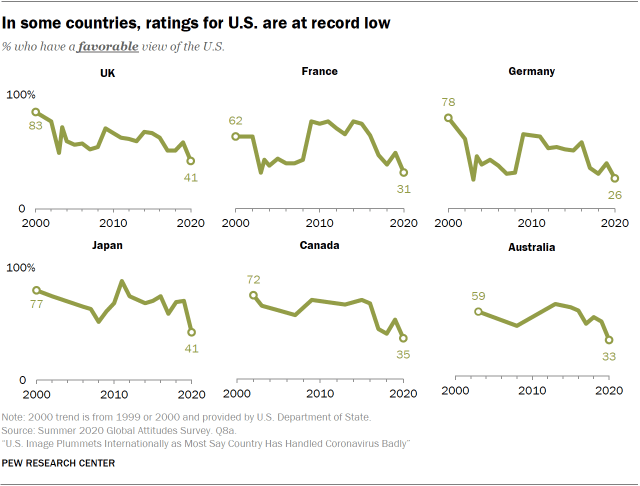
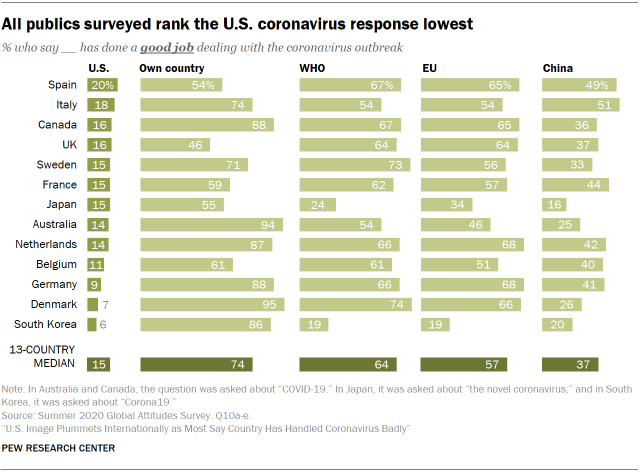
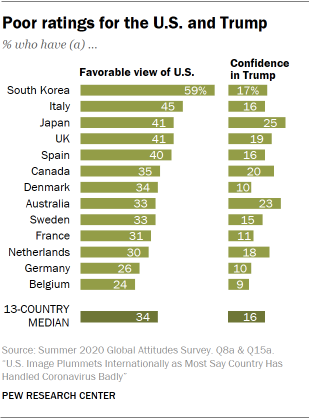
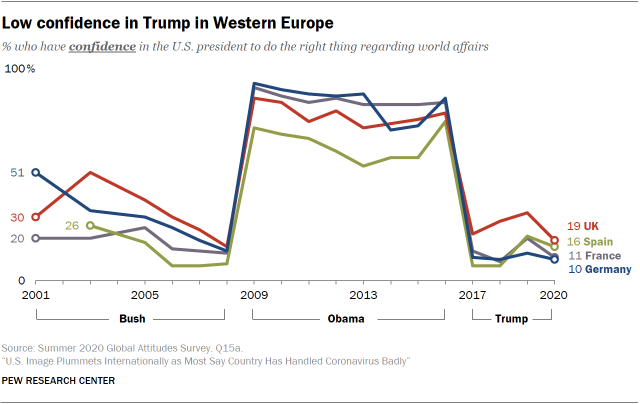
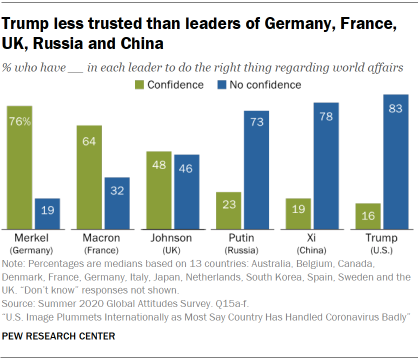
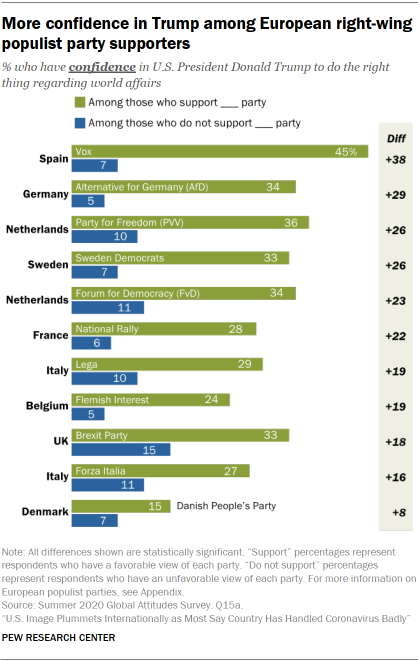
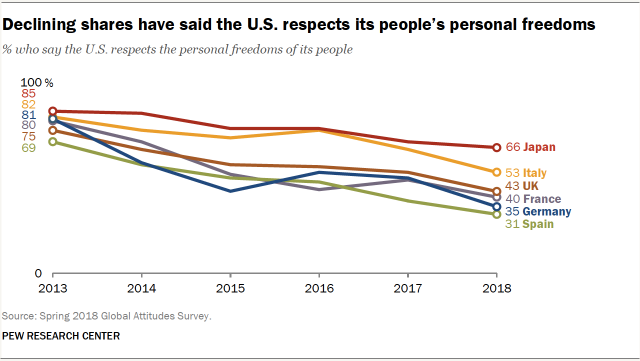
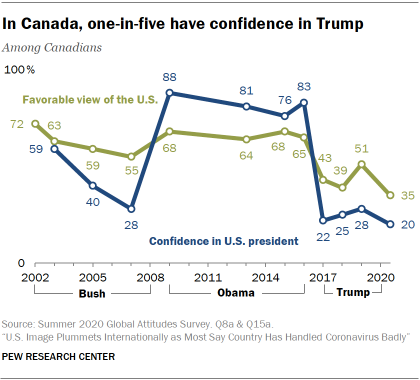
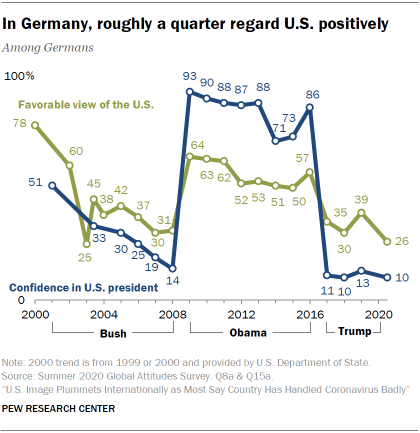
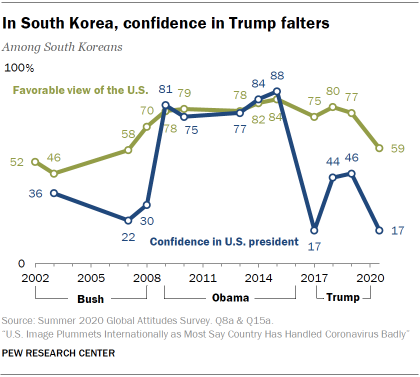
Recent Comments